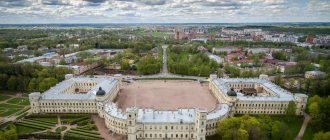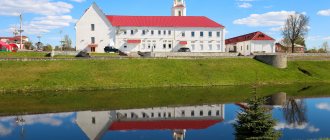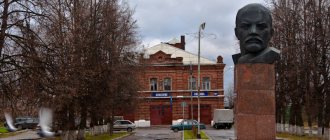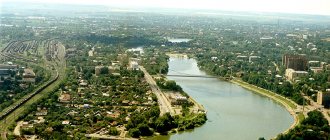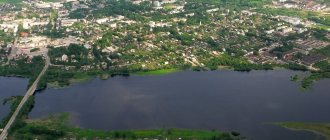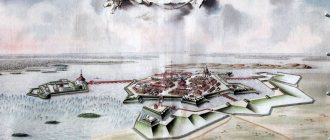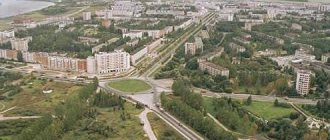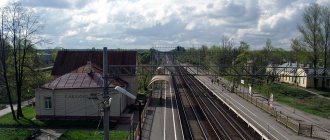Pikalevo
Pikalevo is a city in the Boksitogorsky district of the Leningrad region. The city is located in the central part of the region near the Vologda - Novaya Ladoga highway, 283 km southeast of St. Petersburg. The distance to the regional center, the city of Boksitogorsk, is 27 km. The city is located on the right bank of the Ryadan River.
Story
The city is located on the site of an ancient settlement - the “pikalyov wasteland”, mention of which is found in the scribe book of the Obonezh Pyatina, letters and patrols of Mina Lykov and clerk Yakov Gnevashev in 1620. Later, the “wasteland” became a village and in 1906 gave the name to a station on the St. Petersburg-Vologda railway, and later to the city of Pikalevo.
The village and the station administratively belonged to the Obrinskaya volost of the 5th zemstvo section of the 3rd camp of the Tikhvin district of the Novgorod province.
From August 1, 1927 to June 30, 1930, the newly formed village of Pikalyovo in the Novoderevensky village council was the administrative center of the Pikalyovsky district.
In 1930, deposits of cement limestone and clay were explored in the vicinity of Pikalevo station. In 1935, construction of the cement holding company Eurocement Group and a workers' settlement began on this site, which was completed in the summer of 1941.
Since 1947 it has been an urban-type settlement. In 1954, Pikalevo received the status of a city of regional subordination, and in July 1992 - the status of a city of regional subordination.
In 1996, it left the Boksitogorsky district and became a separate municipal entity.
Since 2006 - again included in the Boksitogorsk district.
By Order of the Government of the Russian Federation dated July 29, 2014 No. 1398-r “On approval of the list of single-industry towns”, it was included in the list of single-industry towns in the Russian Federation with the most difficult socio-economic situation.
Social and economic crisis of 2008-2009
Since the fall of 2008, a difficult socio-economic situation has developed in Pikalyovo, which was caused by the stoppage of production at the city’s three largest enterprises - Pikalyovsky Alumina Plant (belongs to Oleg Deripaska’s Basic Element group), Pikalyovsky Cement (belongs to) and Metakhim", which are connected by a single technological chain.
On August 1, 2008, the Pikalyovsky Alumina Plant stopped supplying nepheline sludge to Pikalyovsky Cement, as Basel-Cement planned to repurpose part of the plant and produce cement on its own. In this regard, on October 1, Pikalyovsky Cement ceased production, and in November announced plans to lay off 650 employees out of the thousand who previously worked there. The situation has become more complicated: due to the cessation of supplies of carbonate solution, the production of soda and potash has been reduced.
On November 8, a rally against the shutdown of production at city enterprises was held in Pikalyovo, which attracted about 4 thousand people. However, staff reductions continued.
In February 2009, production at the Pikalyovsky Alumina Refinery was stopped, and the layoff of 504 employees was announced. On February 14, a protest rally took place in Pikalevo again.
On February 18, production stopped at , and it was announced that all 267 employees would be laid off from March 1. A little later, it was announced that 515 employees of the Pikalyovsky Alumina Plant and 180 employees of Pikalyovsky Cement would be laid off.
On March 12, Governor of the Leningrad Region Valery Serdyukov went to a personal meeting with Russian President Dmitry Medvedev. Serdyukov expressed hope that Pikalev’s enterprises will resume work. However, already on March 27, the governor announced that social tension in the city would increase.
In April, production at Pikalyovsky Cement partially resumed, and plans were announced to hire 200 employees. On April 15, a rally of residents of Pikalevo took place in St. Petersburg. On April 28, Valery Serdyukov announced that all unemployed people in Pikalyovo would be paid a lump sum of 5 thousand rubles: “Here on TV they show that the residents of Pikalyovo are starving. So, with this money we are solving this problem.”
On May 15, hot water and heating were turned off throughout the city. The local thermal power plant cut off the city from their supplies due to the debts of one of the city-forming enterprises, JSC BaselCement - Pikalevo.
On May 20, some residents of Pikalyovo broke into the city hall while a meeting was being held there to resolve city problems. The meeting was attended by local officials, representatives of the prosecutor’s office, representatives of the gas supplier to the Pikalyovskaya CHPP - Petersburgregiongaz - and representatives of the owners of one of the city-forming enterprises - BaselCement - Pikalyovo.
After this, on May 21, the city of Pikalevo was allocated 20 million rubles as a subsidy from the budget of the Leningrad region. On the same day, a permanent working group of the regional government was created, whose tasks include solving pressing issues of the city of Pikalyovo, as well as monitoring the activities of the local administration to effectively spend the funds received. It was announced that residents of Pikalyovo would be provided with financial assistance, additional guarantees, as well as educational opportunities.
On the morning of June 2, 250-300 residents of Pikalevo blocked the federal highway Novaya Ladoga - Vologda in protest against the difficult socio-economic situation, timing their action to coincide with the visit of the Chairman of the Russian Government Vladimir Putin to St. Petersburg. Law and order was ensured by employees of the local police department, who refused any use of force, but did not allow any unrest to occur. There was no serious traffic jam (as the media claimed). To resolve the conflict, the Boksitogorsk prosecutor, representatives of the administration, as well as the general director of Baselcement-Pikalyovo Anatoly Maslikov arrived at the scene.
On the same day, the governor of the Leningrad region signed a decree allocating 5 million rubles for Pikalevo. BaselCement will have to use these funds to pay off wage arrears to the employees of the thermal power plant; the amount of this debt is approximately 5 million rubles. In addition, Valery Serdyukov signed another order, according to which 1 million 700 thousand rubles will be transferred to the Boksitogorsky district to provide support to residents of the region who find themselves in a difficult life situation.
By the evening of the same day, the protest ended, traffic on the A114 federal highway Novaya Ladoga - Vologda was completely restored.
On June 3, the Chairman of the Committee on Labor and Social Policy A. Isaev and Deputy Mikhail Tarasenko (United Russia faction) introduced to the State Duma a bill “On the circulation of property complexes owned by legal entities Basel-Cement LLC, Eurocement Group CJSC and LLC Management Company “SevZavProm” into the ownership of the Russian Federation.” However, it soon became clear that this bill had more to do with PR than lawmaking, and the government did not support this initiative.
On the same day, June 3, a meeting was held on a set of Pikalyovsky problems, which was held in Moscow by Deputy Prime Minister of the Russian Federation Igor Sechin with the owners of the Pikalyovsky factories - the owners of Eurocement Group and SevZapProm. As Maria Nikolaeva, press secretary of SevZapProm Management Company, stated, no decisions were made at the meeting with Sechin and everything was “postponed until tomorrow.” However, PhosAgro, in its press release on June 8, 2009, emphasized that the signing of the agreement on June 4 was done in pursuance of the decision of the meeting with I. I. Sechin.
On June 4, Prime Minister of the Russian Federation Vladimir Putin, Deputy Prime Minister Igor Sechin, Head of the Ministry of Regional Development Viktor Basargin, Presidential Envoy to the Northwestern Federal District Ilya Klebanov, Governor of the Leningrad Region Valery Serdyukov, Head of the Federal Antimonopoly Service Igor Artemyev, Head of Russian Railways Vladimir arrived in Pikalevo Yakunin, head of VTB Bank Andrey Kostin, owner of Basel-Cement Oleg Deripaska, general director of SevZapProm Management Company LLC Alexander Utevsky, chairman of the board of directors of Eurocement Group CJSC Filaret Galchev, member of the Board of Directors of SUAL-Holding OJSC Alexander Bronstein, Deputy Minister of Industry and Trade Denis Manturov. At about 16:00, a meeting began at the Pikalyovsky Alumina Refinery with the participation of these individuals, as well as representatives of regional authorities and labor collectives.
At the meeting, Vladimir Putin told the protesters: “The last thing you could do to prevent me from coming here was to start breaking the law here.”
During the meeting, BaselCement and Phosagro signed an agreement on the resumption of supplies of raw materials (nepheline concentrate) to the BaselCement-Pikalevo enterprise up to 85 thousand tons per month at a price of 750 rubles per ton (previously the price was 2 thousand rubles per ton, and in 2008 they sold for 1534 rubles). In addition, the Russian government promised to compensate Russian Railways for losses in connection with the transportation of nepheline concentrate from rail to Baselcement-Pikalyovo at a fixed tariff of 300 rubles per ton. Vladimir Putin ordered that all wage arrears to workers of the three Pikalyovsky factories (41,242,000 rubles) be paid on the same day. The Prime Minister also ordered the signing of a tripartite easement agreement (the ability to use common infrastructure) between the owners. “You have made thousands of people hostage to your ambitions, unprofessionalism and greed. It is unacceptable. Where is the social responsibility of business?” the prime minister said to business owners during the meeting.
Even before Putin’s departure, at about 14:00, an astonished roar echoed through the crowd of hundreds waiting for him at the entrance. People began receiving SMS messages on their phones: “Your bank account has received funds in the amount of...”. Towards nightfall, the Pikalyovo ATMs ran out of money.
On June 5, wage arrears for employees of three city-forming enterprises of Pikalyovo were fully repaid; on Friday, at the city thermal power plant, which was stopped due to debts, the boiler was flooded and the burner was lit. On the same day, Russian Prime Minister Vladimir Putin sent a working group to Pikalevo led by Deputy Minister of Industry and Trade Denis Manturov to promptly resolve all issues.
On the morning of June 6, hot water was provided in Pikalyovo, which was turned off at the beginning of May.
On June 9, a meeting of the operational headquarters for the restoration of the Pikalyovsky production complex was held in Pikalyovo with the participation of the Governor of the Leningrad Region Valery Serdyukov. At this meeting, agreements were signed between the management, Metachem, Eurocement Group and BaselCement, allowing the resumption of production at all four enterprises. The production plan was agreed upon until the end of 2009.
On July 16, the All-Russian Center for the Study of Public Opinion (VTsIOM) released survey data, according to which 40% of Russians assess Vladimir Putin’s decision to reopen unprofitable enterprises in Pikalyovo as the right step, and 44% believe that this is only a temporary measure and to achieve success they advise further nationalize all private enterprises in the city.
In October, the media reported new disagreements between the enterprises of the Pikalevo industrial complex regarding the prospects for further work.
Lessons Pikalevo
The scandal in the city of Pikalevo, Leningrad Region, where three city-forming enterprises almost stopped and several thousand people found themselves on the street at once, agitated wide sections of the federal public. Yesterday was spent discussing whether Vladimir Putin was going to Pikalevo after all or not (he did arrive and this is a separate topic for discussion), and United Russia deputies even introduced a draft law on the nationalization of Pikalevo enterprises.
The story of Pikalevo is at its zenith, and there is every reason to believe that the enterprises will soon start operating, and the media and the public will forget about the existence of the town. It's time to draw conclusions - and there are plenty to draw from. There are many aspects to the situation around Pikalevo - social, economic, corporate, managerial - and they all came out at the right moment in order to demonstrate in one fell swoop what “small Russia” is like today. Let's try to sort them out one by one.
Story one: corporate
All three of the Pikalevo enterprises that emerged were part of a single production line and all three ended up in the hands of different owners (see reference below). Or rather, they didn’t turn out right away. By the beginning of the 2000s, they were concentrated in one hand and prepared for sale. Two of the three plants were sold. It’s okay, but the history of Russian business is such that if enterprises included in the same cycle appear under different owners, a conflict is programmed. They say that the relationship between a monopoly supplier and a monopoly consumer is not spelled out in economic theory - there is too little theory. The Russian specificity is that there are quite a lot of such relationships. Suppliers of Magnitogorsk once launched an attack on the plant with the aim of seizing it, and the city of Magnitogorsk was forced to “tighten its belts” for several months. And recently, AvtoVAZ’s suppliers left the plant without components: the plant had non-payments, and the suppliers did not want to accept payment in “non-real” money. It is quite understandable for both of them: both enterprises are in crisis (including increased risks of non-payments and falling sales) and no one wants to engage in charity.
In Pikalevo, Russian history came out in miniature: the owners either began to fight for assets, or one of the owners (most likely, Basel Cement) lost interest in the profile of the alumina refinery, or some other misunderstanding occurred. At least, the management of the Eurocement Group accused Basel Cement of an attack in order to seize their Pikalevskoye, and they even allocated assistance in the amount of 25 billion - just don’t fire the staff.
It cannot be said that various experts did not warn the authorities that there would still be an outburst of social energy somewhere. They warned. Evgeny Gon described a likely scenario for such a protest. Quote: “In the city of Nsk there was a massive release of people from the local engineering (metallurgical, chemical, etc.) city-forming enterprise. Its owner tried for several months to prevent this by sending the most valuable employees on administrative leave with 2/3 of their salaries and firing almost the entire office staff. But the miracle did not happen: the demand for the products of this plant never recovered to pre-crisis levels, and the money to maintain the remaining staff also ran out. So we had to fire everyone.” Then there were completely nightmare scenarios, up to the capture of the governor by protesters.
Why didn’t they keep an eye on Pikalevo? Due to the fact that the federal authorities have a rather poor understanding of the country they govern. That is, they operate relatively well with statistics and gross indicators. There is a problem with detailing: a) there is no feedback mechanism, b) there is relatively little real field sociology in Russia, c) data from various monitoring does not give a complete picture, d) local authorities are often afraid to report to the top about conflicts that they cannot deal with on their own. These are the basic problems that need to be solved and solved relatively quickly - the information vacuum of the authorities has already led to the worst consequences in the past - Nicholas II, for example, thanks to those around him, was confident that the people adored the monarch, and the alarmists who claimed the opposite had nothing in the essence of Russian statehood do not understand. He stayed, it must be said, until the February Revolution, after which he wrote down the famous “treason, cowardice and deceit are all around.”
Citizens should also draw conclusions: one of the few truly effective forms of protecting workers from employers in Western industrial society are trade unions. If citizens want the situation with Pikalevo not to be repeated - which is inevitable - they need to come up with forms of self-organization to protect their interests from the interests of businessmen. Of course, the current Labor Code makes strikes a difficult matter, but the employer, burdened by an agreement with the trade union, will think twice before dismissing the workers of the enterprise “for nothing” or reducing their wages. Pikalevo workers have a good example just at hand - the Vsevolozhsky trade union has been generally successfully opposing the plant management for several years and defending its rights. Other examples are not so civilized: blocking highways and forcibly seizing the mayor's office as a method of achieving social justice are like a riot.
Story three: informational
Relatively independent media began to actively highlight the Pikalevo topic (federal television channels diligently avoided the protests). Many saw this as confirmation of their terrible conspiracy ideas. Versions varied - either someone “ordered” “Basel-cement” with Oleg Deripaska (the leader of his company’s trade union even stated that the company’s workers eat dogs, and promised to feed Oleg Vladimirovich himself “Buchenwald stew”), or Governor Serdyukov .
I don’t want to delve into these arguments, but it’s worth noting that if it weren’t for the coverage in the media, Pikalevo residents could have protested for another 10 years – and it’s not a fact that at least someone would have paid attention to their problems. Freedom of speech (albeit relative, half-hearted) here played into the hands of both citizens and authorities.
The information wave simply obliged the authorities to take decisive steps - and so a group of deputies introduced a bill on the nationalization of enterprises with (small) compensation to the owners. The conversation about nationalization will probably not turn into reality, but we will once again warn deputies against such statements. We are talking about voluntaristic nationalization a la Hugo Chavez, with virtually no justification. The right to private property is unshakable - this is one of the main liberal values. The Russian authorities usually understand this well, and any “nationalization” of YUKOS or AirUnion still took place according to the “legal” scenario - tax claims, bankruptcy for debts. Taking and taking away an enterprise from the owner, citing the expediency of the moment, is the same as taking a toaster from a housewife, saying that the mayor of the city will manage it better - this is neither self-evident nor illegal.
It’s another matter if the owner himself is ready to get rid of the illiquid property and receive adequate compensation - here the state is left in the cold. In this context, Evgeniy Gontmakher is right when he believes that the decision on nationalization will mean that dozens of Pikalevo companies will appear throughout the country. This will be corporate blackmail of the state - there may be a wave of layoffs (“we already have 15 thousand unemployed - buy us”, “and we have 30 thousand - buy us”).
I don’t even want to think about how portfolio investors will behave if nationalization takes place. They reacted, as we remember, violently to Mechel, which was of little interest to portfolio holders. To transform Russian practice into Venezuelan... Still, it would be more useful if this were such a “cunning” PR move by individual party members or even the entire “party in power.”
Story four: management
So, the highest point of the Pikalevo drama - Putin flew to Pikalevo. Or he didn’t arrive - his press secretary did not deny the possible visit, but stated (at the time of writing this text) that Putin had not yet been to Pikalevo. In any case, Putin flew to the St. Petersburg Forum, but Pikalevo had to be included in the program. The President and Prime Minister complained that manual control was wrong, institutions needed to be built. And again we have before us a bold management decision, the top officials of the state on the front line, making decisions, making noise, installing water supply and donating dresses. Only in this case everything is serious - the problem of three small enterprises and several thousand people cannot be solved by anyone except the top officials. A conflict or a situation of medium complexity cannot be resolved without their participation. This is an extremely alarming signal and this is another lesson from the Pikalevo crisis.
The state administration machine and local authorities turned out to be incapable of solving the problem of a small town. There are two problems in this: the problem of resources and the problem of competencies. Regions and municipalities regularly complain about underfunding; the situation has worsened since the beginning of the crisis - this is a fact. And the authorities cannot find free funds, say, to employ Pikalevo workers - for example, for public works. Or they don’t want to - and here there is a problem of competence. The federal center and supervisory and punitive authorities are actively ensuring that regional authorities do not allow special luxury when spending money. In turn, the regions and regional security officials - the Ministry of Finance - monitor the municipalities. Ultimately, this leads to the “sword of Damocles” of wasted spending hanging over every boss. The hardware choice is obvious: do not spend anything in excess of what is allocated and recorded in the local budget, shifting responsibility for force majeure situations to other levels of government or careless businessmen.
The results are disappointing. A particular case of a small city demonstrates several pathologies in the development of Russian society and government. When supporters of the current political system say that there is no agreement between the authorities and the population on “stability in exchange for political passivity,” they are quite likely right. There is an agreement “stability in exchange for the renunciation of radical forms of protest” - rebellion, seizure of power. If this agreement is violated, the result is Pikalevo.
It is also unpleasant that the political system (in the broad sense) is not capable of solving private problems. There is a lack of flexibility, areas of responsibility are distributed indistinctly, there is no system for diagnosing social moods, and feedback is not built (not really to consider “Putin’s reception rooms” as such). And again it turns out to be Pikalevo.
The inability of hired workers to protect their rights from business was largely inspired by the state. The Labor Code of 2002 significantly narrowed the field for the activities of independent trade unions. Formally, the owner is almost always right in labor conflicts. People do not accept this and take to the streets. It turns out Pikalevo.
The worst possible scenario today is already being discussed in the media. It is briefly described as follows: there are many such cities across the country, and where it will “crash” next is difficult to predict.
Help: business in Pikalevo
On October 12, 1992, the open joint-stock company “Pikalevskoe Association “Glinozem”” was registered (since April 29, 1996 – OJSC “Pikalevskoe Association “Glinozem”).
On October 15, 2001, as a result of a merger with Volkhov Aluminum OJSC, it was reorganized into Pikalevsky Glinozem, which became a branch of Metallurg OJSC.
Reorganization and sale:
In 2001, 81.8% of the shares in Metallurg OJSC belonged to a group represented in St. Petersburg by entrepreneurs Mikhail Shlosberg and Alexey Shmargunenko (in this group, 52.3% of the shares belonged to (Great Britain, controlled, as it was believed, by the co-owner of the Flora bank -Moscow" to Alexander Bronstein and partners), 13.68% - Shanton (Malta), 15.69% - LTR Enterprise LLC). In addition, 14% of the shares of Metallurg were in the hands of the Russian Federal Property Fund (RFFI), and the remaining 4.32% were distributed between JSC Svetoch, LLC Nevsky Granit and several individuals. 14 percent of the shares were bought by Oleg Deripaska's Rusal in 2003. In 2003, the business of Bronstein and partners merged with SUAL: (an agreement was reached at the end of 2002) along with other aluminum assets (in exchange for 18 percent of shares, later the share was reduced to 11 percent) to the company of Viktor Vekselberg and partners Pikalevsky alumina was transferred. Alexander Bronstein and his partners got rid of their stake in SUAL at the end of 2005. As a result of the reorganization of SUAL's business after the merger with Rusal (the agreement on the transaction was reached in 2006), in February 2008, Basel-cement-Pikalevo became a separate CJSC, controlled by Basel-cement.
On January 1, 2004, on the basis of the cement and soda-potash production of the Pikalevsky Glinozem branch, subsidiaries were created, respectively, Pikalevsky Cement CJSC and Metakhim CJSC.
Pikalevsky Cement was sold to Inteko Elena Baturina in 2003-2004, and in 2005 it was resold to Eurocement Group of Filaret Galchev.
CJSC Metakhim remained with Bronstein and partners.
Bank "Flora-Moscow":
In 2002, Flora-Moscow Bank controlled Metallurg OJSC (since October 2001, it unites Volkhovsky Aluminum OJSC and Pikalevskoye Association 'Glinozem' OJSC), Volgograd Aluminum OJSC (almost 100% through VALK-AG LLC ), Volgograd Metallurgical Plant, OJSC Kalachevsky Shipbuilding and Shiprepair Plant, OJSC Klyuchevsky Ryazantsvetmet.
Historical photos of the sports Leningrad region. Pikalevo, Tosno, Podporozhye
In the Leningrad region, 2021 has become the year of a healthy lifestyle. In this regard, ivbg.ru continues the project “Historical Photos of the Sports Leningrad Region” and publishes the tenth and final part about Pikalevo, Tosno and Podporozhye. On January 1, #marathon365 started in the 47th region - every day there is important and interesting information about health, sports, and events for everyone. On Instagram you can find a separate profile dedicated to the year of healthy lifestyle.
You might be interested
Historical photos of the sports Leningrad region. Priozersk
In the Leningrad region, 2021 is the year of healthy lifestyle. The editors of ivbg.ru dedicated the project “Historical Photos of the Sports Leningrad Region” to this occasion and today...
22.02.2019 2296
Period of creation: 60s of the twentieth century. Material, technique: photo paper, black and white photo printing. Size: 24 x 18 cm
Description : photograph. Participant in winter ski competitions, school No. 2.
You might be interested
Historical photos of the sports Leningrad region. Shlisselburg
In the Leningrad region, 2021 has become the year of a healthy lifestyle. In this regard, ivbg.ru continues the project “Historical photos of sports...
20.02.2019 3185
Period of creation: 60s of the XX century. Material, technique: paper, photo paper, black and white photo printing. Size: 17 x 11.5 cm
Description : photograph. On the way home. Workers of the Trud sewing association during a ski trip.
You might be interested
Historical photos of the sports Leningrad region. Slates
In honor of the year of a healthy lifestyle in the Leningrad region, we continue our project “Historical photos of the sports Leningrad region”. Today ivbg.ru presents…
15.02.2019 3836
Period of creation: 60s of the twentieth century. Material, technique: photo paper, black and white photo printing. Size: 24 x 18 cm
Description : photograph. During winter sports games for students of school No. 2. Competitions: sled racing.
The photographs are in the Podporozhye branch of the State Budgetary Institution of Culture of the Leningrad Region “Museum Agency” - Podporozhye Museum of Local Lore.
You might be interested
Historical photos of the sports Leningrad region. Volkhov
In the Leningrad region, this year has become the year of a healthy lifestyle. In this regard, ivbg.ru continues the project “Historical photos of sports...
18.02.2019 3146
Period of creation: 1950s. Material, technique: photo paper, black and white photo printing. Size: 14.0 x 9.0
Description: one man is standing on a ladder leaning against a pole, tying a volleyball net, two are looking at him, two more are slightly to the right side of them.
You might be interested
Historical photos of the sports Leningrad region. Meadows
In the Leningrad region, the current year is taking place under the auspices of a healthy lifestyle. There is a separate channel on Instagram @zdorovo_lo dedicated to him. And also #marathon365 - every...
13.02.2019 3473
Description: A football team lined up in descending order against the backdrop of a football goal. Eleven men in sports shorts, T-shirts, and leggings are clearly visible, other people are visible, including behind the goal. From left to right: team captain P. Smolin, goalkeeper V. Gryzhemailov, A. Ivanov, A. Konovalov (Rul), M. Babenin, M. Gavrichenkov, M. Planin, Viktor Vladimirovich Sinashkin, the last team member without a T-shirt - A. Smolin (Golysh). The goalkeeper has a soccer ball in his hands.
You might be interested
Historical photos of the sports Leningrad region. Kingisepp
In honor of the year of a healthy lifestyle in the Leningrad region, we continue our project “Historical photos of the sports Leningrad region”. Today ivbg.ru publishes…
08.02.2019 2158
Period of creation: 1920-1930 Material, technique: photo paper, photo printing. Size: 14.2 x 9.2
Description : eight young people in sports shorts against a background of trees. Those depicted in the first row are sitting in different poses - in the center with their legs crossed, on either side of him reclining, leaning on their elbow. In the second row, those depicted on the sides stand on one knee, next to them stand half sideways, standing straight in the center. Those standing have their hands folded on their chests.
All photos are in the Tosnensky branch of the State Budgetary Institution of Culture of the Leningrad Region “Museum Agency” - Tosnensky Museum of History and Local Lore.
You might be interested
Historical photos of the sports Leningrad region. Kirishi
Under the auspices of a healthy lifestyle, 2021 is taking place in the 47th region. A separate channel @zdorovo_lo dedicated to him even appeared on Instagram. A…
11.02.2019 2606
7. —
Period of creation: 50s of the XX century. Material, technique: photo paper, black and white printing. Size: 11.3 x 7.8
Description: the first football team in Pikalevo. In the photo: men in sportswear stand on the field.
You might be interested
Historical photos of the sports Leningrad region. Vyborg
In the Leningrad region, 2021 is celebrated under the auspices of a healthy lifestyle. A separate channel @zdorovo_lo dedicated to him even appeared on Instagram. And with...
06.02.2019 2696
8. —
Creation period: —. Material, technique: photo paper, black and white printing. Size: 17.3 x 12
Description : mass skiing in the city of Boksitogorsk. In the foreground is the youngest participant - Olya Vasilyeva, 1 year 9 months.
You might be interested
Historical photos of the sports Leningrad region. Lodeynoye Pole
In honor of the year of a healthy lifestyle in the 47th region, we continue our project “Historical photos of the sports Leningrad region.” Today ivbg.ru publishes…
10.02.2019 2120
9. —
Period of creation: 50s of the XX century. Material, technique: photo paper, black and white printing. Size: 9.5 x 13.8
Description : the first football team in Pikalevo. In the photo: men in sportswear stand on the field.
All photographs are in the Pikalevo branch of the State Budgetary Institution of Culture of the Leningrad Region “Museum Agency” - Pikalevo Museum of Local Lore.
On the situation in the city of Pikalevo. Dossier
Pikalevo is the administrative center of the Pikalevo urban settlement of the Boksitogorsk municipal district of the Leningrad region. Located 246 km east of St. Petersburg. The population is more than 22 thousand people. There are 3 city-forming enterprises in the city - alumina (belongs to the Basic Element group), Pikalevsky Cement (part of the Eurocement Group) and Metakhim, which are connected by a single technological chain.
By the fall of 2008, a difficult socio-economic situation had developed in the city. The owners of these enterprises were unable to agree on prices for the supplied raw materials. On August 1, 2008, BaselCement-Pikalevo suspended supplies of raw materials to Pikalevo Cement, which ceased production in October, and in November announced plans to lay off 650 employees out of a thousand. The situation also became more complicated at the plant, where production was reduced due to the cessation of supplies of raw materials. On November 8, a rally against the shutdown of production was held in Pikalevo, which attracted about 4 thousand people.
At the beginning of February 2009, the production of BaselCement-Pikalevo was stopped, whose management announced the layoff of about 500 employees. On February 14, a protest rally took place in the city again. On February 18, production stopped and all 267 employees were laid off. Later, the upcoming layoffs of employees of BaselCement-Pikalevo and Pikalevo Cement were announced. As a result of the shutdown of city-forming enterprises, thousands of people lost their jobs.
At the beginning of April 2009, production at Pikalevsky Cement partially resumed. On April 15, residents of Pikalev held a rally in St. Petersburg. In mid-May, due to debts on gas supplies to BaselCement-Pikalevo, the local thermal power plant, which supplies about 70 percent of the city’s housing stock with heat and hot water, including kindergartens and hospitals, was stopped. On May 21, the city was allocated 20 million rubles from the budget of the Leningrad region.
On June 2, 2009, as a sign of protest against the difficult socio-economic situation, about 300 residents of Pikalevo blocked the Novaya Ladoga - Vologda federal highway. On the same day, the governor of the Leningrad region signed a resolution on the allocation of 5 million rubles, which BaselCement was supposed to use to pay off wage arrears to the employees of the thermal power plant. By another order of the governor, 1 million 700 thousand rubles were transferred to the Boksitogorsky district to provide support to residents of the region who found themselves in a difficult situation. By the evening of the same day, the protest ended and traffic on the highway was restored.
On June 4, 2009, in Pikalevo, Vladimir Putin, who held the position of Prime Minister at that time, held a meeting with enterprise owners and regional authorities, demanding that the entire production complex be restored. Already on June 5, the arrears of wages to employees of the enterprises were repaid. On June 8, active work began at BaselCement-Pikalevo to resume production. On June 9, agreements were signed between enterprises belonging to the city production complex, allowing production to resume. By the end of the month, workers returned to the factories.
In October 2009, the situation in the city worsened again. (part of the PhosAgro holding) stopped supplying raw materials to BaselCement-Pikalevo. Within a month, the companies entered into a new agreement, thereby preventing the shutdown of production in Pikalevo. On December 3, agreements on the supply of raw materials for 2010 were signed between enterprises of the city industrial complex.
Agreements for the supply of various products necessary for the operation of Pikalevo enterprises were signed for 2011, 2012 and 2013.
At the end of 2013, negotiations between BaselCement-Pikalevo and Pikalevo Cement again reached a dead end. Despite the fact that there are only a few days left until the end of the year, the companies included in the Pikalevo production complex have not concluded an agreement for 2014. This threatens a new shutdown of the city-forming enterprises.
